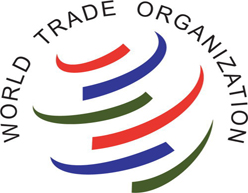Authoritative local and foreign anti-globalization experts do not see prosperity for Russia in WTO

Membership of the World Trade Organization (WTO) will not translate into prosperity for the Russian economy, according to the opinions of leading local and foreign anti-globalization experts aired at a two-day International Scientific and Practical Conference, titled, “Russia, World Crisis and WTO,” which was organized on Dec. 7-8 in Moscow by the Institute of Globalization and Social Movements (IGSM) with the support of the Rosa Luxemburg Fund. The IGSM is an independent intellectual center, whose activities are directed at working out initiatives and researches aimed at enhancing full democratic and radical social and economic transformation of the Russian society.
In the press materials released ahead of the conference, IGSM Director Boris Kagarlitsky highlighted several reasons, why, in his opinion, WTO membership is presently not desirable for the Russian economy. One of these reasons is the current catastrophic global economic crisis, which has impacted negatively on the domestic economy, and as a result, more than half of the nation’s companies are laying off workers in droves. Besides, demand for goods and services is falling at very rapid rate, and along with it, the volumes of trade across all sectors of the local economy, while inflation has continued to remain untamed, the expert said. “The opening of the Russian market in such conditions for international free trade under the WTO umbrella will only make the country more vulnerable to the negative effects of the global crisis.
Similar arguments were put forward by other experts at the “Russia, World Crisis and WTO” conference, where both Russian and foreign experts on globalization and other related international trade issues noted that the proposed membership of Russia in WTO in 2009 will negatively impact on the domestic economy, as it will deprive the country of protection. The experts also criticized all aspects of WTO’s core policies, the norms regulating its operations and the principles guiding the organization’s structure and management. For instance, during the discussions on the WTO principles, Dot Kit, board member of International Institute from South Africa, noted that WTO membership envisages the full adoption of maximal neoliberal economic measures and policies. “The ultimate goal is to maximally reduce the role and presence of the state in the domestic economy, while the current macroeconomic conditions today dictate otherwise.”
Kit also noted that Russian companies will lose their key competitive advantages over foreign corporations in and outside the country after gaining full membership in the WTO. “Many sectors of the Russian economy will become open for privatization, which will definitely have negative implications for the local population. The quality of services will fall, while their prices will rise, as it was the case in most countries after their acceptance in the organization,” she noted. “WTO can simply disappear because in the course of next few years because of the current crisis, while the crisis itself will seriously hit countries, which are still pursuing full liberalization of their economies,” she added. “I have long come to the conclusion that WTO is a dead end, a road to nowhere. The longer I live, the more convinced I become.”
Another issue of contention among the experts is the application of double standards by WTO, citing, as an example, the sanctions usually imposed by the organization against countries that support/subsidize their agro sectors traditionally do not spread to the United States, which also frequently violates the WTO requirements, as this policy is, first and foremost, directed at its [U.S.] competitors. Specifically, Trever Evans, a professor at the Berlin School of Economics, said the organization even sees the aggressive promotion of U.S. agro products as its key mission. “Countries that have tried to limit the importations of genetically modified products into their markets have been accused by WTO of creating artificial barriers in the food sector," he said. "Therefore, it will be naive to think that Russia will become an exception to this policy, because once it becomes a member its agrarian sector will surely come under the direct impacts of these double-standard policies."
The experts also said that the WTO membership will bode negatively for labor relations in the country. Karin Kleman and Andrei Demidov, both from the Collective Action Institute, recounted cases of blatant discriminations against workers in WTO member countries, while Christian Felber from Australia added that WTO is not a democratic organization and not a part of any of the United Nations structures. The experts also condemned the WTO for its negative impacts on ecology, member-states’ educational systems and standards of living of the local populations. The conference delegates also pointed to the rising mass protests all over the world against WTO as a proof of their accusations against the organization.
The conference did not only focus on the prospects of Russia’s WTO membership, but also had comprehensive discussions regarding the nature of the present global economic crisis and its devastating negative impacts on national economies. According to the experts, this crisis was caused by the exhaustion of opportunities of neoliberal models of capitalism. Specifically, Russian economists — Alexander Buzgalin and Andrei Kalganov — noted that labor markets in ‘peripheral countries’ have exhausted their capacities to continuously produce high-level experts and other qualified personnel for the international labor markets, while sharp reductions in incomes in developed capitalist countries are making sales of goods and services more and more difficult. “The further exacerbation of the current global crisis and escalations of its negative consequences are capable of eventually burying the WTO as 'a byproduct of the free market’ era,” the experts concluded.












 Web design,
Web design,